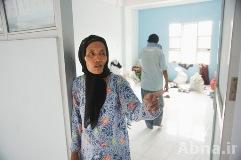(Ahlul Bayt News Agency) - The members of the minority Shia community in Sampang on the East Java island of Madura face prolonged adverse conditions following the local government’s decision to relocate them from their homes to Sidoarjo, which many consider to be a human rights violation.A protest by a group of 10 Shiites from Sampang, by means of cycling from their homes to Jakarta, indicates clear opposition by the community to being evicted from their land. They insist that, instead of resolving the problem, the relocation is merely the easy option chosen by the government to settle an inter-community conflict.At this point, there are two competing dimensions to the relocation policy, namely relocation as preferential treatment for minorities or a human rights infringement. However, I would argue that these competing views can be resolved through a human rights standpoint, mainly by scrutinizing the discriminative element of the policy.First of all, the 1999 Human Rights Law clearly defines discrimination as restriction, harassment or exclusion, whether directly or indirectly, on the basis of religion, race, ethnicity, economic status, gender, language or political belief, which has the effect of nullifying or impairing the recognition, enjoyment or exercise, on an equal footing, of human rights and fundamental freedoms in the political, economic, social, cultural or any other field of public life.The International Covenant on Civil and Political Rights (ICCPR) also defines discrimination in a similar way to the 1999 law, with the notion of possible “preferential treatment” on the basis of, as the Human Rights Committee for the ICCPR puts it, “a state where the general conditions of a certain part of the population prevent or impair their enjoyment of human rights”.Departing from what the laws say, if the relocation policy is to be seen as preferential treatment, in principle, it should arguably be intended to halt any further conflicts among citizens and may in the end resolve horizontal conflicts.In this sense, preference could be briefly described as a view of granting a (disadvantaged) subject more desirable treatment than others. Disadvantaged in this context means vulnerability to human-rights violations, which may be caused by various factors.As human rights law sets out to protect the rights of victims, the state ought to treat these groups differently, or to some extent preferentially, compared to the rest of society.But, what about when the state’s preference, in this case the relocation policy, harms minority rights?In human rights discourse, there are three cumulative elements that should be fulfilled in determining whether an action by the state is considered a human rights infringement: First, the action contravenes human rights law; second, it constitutes interference in people’s rights; and third, the action does not fall within the terms of legitimate limitation or lawful derogation.In my view, giving an a contrario interpretation of the three elements, the relocation policy primarily, as part of preferential treatment, should be considered a legitimate differentiation as long as such action is needed to correct a discriminative event in fact.It has thus to be able to uphold two legitimate aims, covering: first, the nexus between the conflict’s root cause and the need for relocation, and second, relocation should serve as a tool to sustain restutio in integrum (restoration to the original condition).While preferential treatment is essentially needed to overcome and diminish the root cause of a discriminative condition, it should also be temporary by nature and ought to be taken on a case by case basis.The lack of human rights understanding in the relocation policy would not provide a legitimate aim for such differentiation and would also be hardly considered a necessary method in a democratic society. It is generally accepted that democratic societies should promote pluralist communities; whereas relocation puts peoples in clusters, which might impair democracy itself.To sum up, the plan to relocate the Shia population anywhere in the country will not effectively prevent religious violence if it fails to accommodate human rights principles.The absence of a broad and adequate human rights comprehension of this issue may create a kind of shortcut, not to protect the persecuted, but merely to provide satisfaction to a predominant, stronger, majority.The writer is a researcher at the human rights research and development agency, the Law and Human Rights Ministry. The views expressed are personal./129
source : Jakarta Post
Tuesday
2 July 2013
7:30:00 PM
436332

The members of the minority Shia community in Sampang on the East Java island of Madura face prolonged adverse conditions following the local government’s decision to relocate them from their homes to Sidoarjo, which many consider to be a human rights violation.
